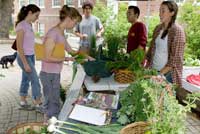Sep 2 2008
The University of New Hampshire has launched a groundbreaking EcoGastronomy program that takes students to the field, the kitchen, the lab and Italy to study the complexities of sustainable food systems. The EcoGastronomy dual major is the first such program at any U.S. university, a one-of-a-kind learning experience that links the fields of sustainable agriculture, hospitality, and nutrition.
 Organic Garden Club: UNH’s student-run Organic Garden Club, founded in 2003, maintains a two-acre garden on university land, supplying certified organic produce to UNH dining halls and to the community via a weekly on-campus farm stand. Credit: UNH Photographic Services
Organic Garden Club: UNH’s student-run Organic Garden Club, founded in 2003, maintains a two-acre garden on university land, supplying certified organic produce to UNH dining halls and to the community via a weekly on-campus farm stand. Credit: UNH Photographic Services
“We are seeing a growing student interest in food and sustainability and an eagerness to understand and connect with the local, regional and global food system,” says Joanne Curran-Celentano, professor of nutritional sciences at UNH and a faculty founder, with Ray Goodman, professor of hospitality management, and others, of the dual major. “EcoGastronomy is designed to engage students in this deeper meaning of eating and to position them to become informed food citizens.”
As a dual major, EcoGastronomy must be taken alongside a declared primary major. The program is a partnership of UNH’s College of Life Sciences and Agriculture and Whittemore School of Business and Economics, in collaboration with the University Office of Sustainability. It includes two courses specific to EcoGastronomy as well as existing courses food and beverage management (in the Whittemore School hospitality program), and food and society and sustainable food production (in the College of Life Sciences and Agriculture). The program also requires a semester abroad at the University of Gastronomic Sciences in Pollenzo, Italy, and language proficiency in Italian.
Depending on their primary majors, EcoGastronomy graduates might work within food service, catering or the restaurant industry; manage or own a farm, greenhouse or nursery; teach or write about food-related issues; or be involved in wholesale and retail marketing, food policy, or nutrition and health assessment.
“UNH hospitality management students who want to graduate with an edge are interested in the dual major in EcoGastronomy because it sets them apart in a competitive industry that is becoming more sustainably aware,” says Dan Winans, faculty coordinator of the dual major and an adjunct professor in hospitality management at the Whittemore School of Business and Economics.
EcoGastronomy – the word connects “gastronomy,” meaning “the art and appreciation of food,” with agriculture and the environment, connoted by “eco” – came about after Slow Food International founder Carlo Petrini came to UNH to receive an honorary degree in 2006. Petrini is founder of the University of Gastronomic Sciences.
“The new dual major in EcoGastronomy represents UNH’s core academic principles, including applying intellectual resources to today’s issues and helping students to develop the critical thinking and interdisciplinary knowledge they will need in their professional and civil lives,” says Bruce Mallory, UNH provost and executive vice president.
EcoGastronomy is part of UNH’s Food & Society Initiative, which advances local food procurement, civic and sustainable agriculture, innovative solutions to agricultural and food system challenges, social justice in the food system, and health and wellness. “The cumulative impact of things like the dual major in EcoGastronomy, the organic research dairy farm, the Local Harvest initiative with UNH Dining, and the New Hampshire Farm to School Program is that students at UNH experience and learn how to advance sustainability in very tangible ways,” says Tom Kelly, UNH’s chief sustainability officer.
UNH, home of the nation's first endowed office of sustainability in higher education, is a leader in integrating sustainability throughout its curricula, operations, research, and engagement efforts. UNH is committed to being a sustainable food community that integrates the ethics, science, technology, and policies of civic agriculture and community food security across the university’s policies and practices. Discover the sustainable learning community at UNH at http://sustainableunh.unh.edu and http://discoversustainability.org. More information about the dual major in EcoGastronomy is available at http://unh.edu/ecogastronomy.